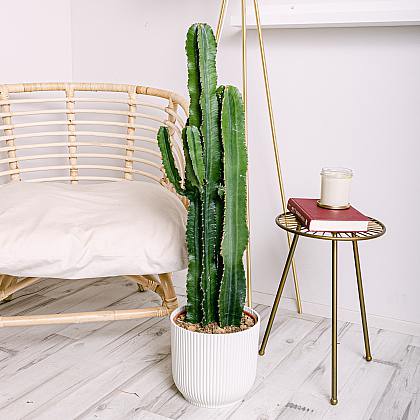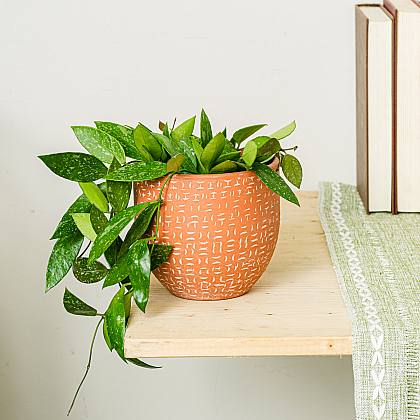Find out why soil is key to the success of your houseplants
Find out why soil is key to the success of your houseplants. If you're like me, you probably love having plants at home. They are beautiful, fill the living...
Find out why soil is key to the success of your houseplants. If you're like me, you probably love having plants at home. They are beautiful, fill the living space, and make us feel good. But have you ever wondered why some plants grow lush and others wilt quickly? The answer may lie in the substrate. Yes, that magical material that holds our beloved little plants. In this article, we're going to explore the importance of substrate in houseplant growth and give you tips on choosing the right one. Get ready to discover the secrets behind green success!
The Importance of Substrate in Plant Growth
Substrate is a key element in plant growth, and we can't underestimate its importance. It's like the home of our beloved houseplants, providing them with the nutrients and support needed for their development. Without a good substrate, our plants can struggle to grow and thrive. Imagine living in a house with no solid foundation or no good foundation. It would be hard to stay stable and healthy, right? The same goes for our plants. The substrate provides them with stability and essential nutrients so that they can grow strong and healthy. So, if you want your houseplants to be a success, make sure you choose a quality substrate that suits their specific needs. Spare no expense when it comes to the substrate, as investing in a good one can make all the difference in the growth and beauty of your plants. Remember that each plant has different requirements, so it's important to research what type of substrate is best suited for each. In short, don't underestimate the importance of substrate in the growth of your houseplants. It's the foundation upon which they flourish and thrive, so give your plants the best home possible.
What is substrate and why is it key for your houseplants?
The substrate is like the home of our houseplants, it is the place where they take root and grow. But what exactly is substrate and why is it so important for our plants? Substrate is a material that is used to provide plants with a suitable environment for their development. It's like the nourishment they need to grow strong and healthy. Without a good substrate, our houseplants would not be able to get the necessary nutrients or retain enough moisture to survive. In addition, the substrate also plays a crucial role in oxygenating the roots, allowing them to breathe properly. That's why choosing the right substrate for our plants is key to their success. Each type of plant requires a specific substrate, whether it is sandier, more clayey or with higher organic content. By providing them with the right substrate, we will be ensuring that our plants have the ideal conditions to grow and thrive. So the next time you're shopping for soil for your houseplants, remember the importance of substrate and choose wisely. Your plants will thank you with green leaves and beautiful flowers.
Recommended Substrate Types for Different Types of Plants
When it comes to growing houseplants, choosing the right type of substrate is critical to their growth and development. There are different types of substrates recommended for different types of plants, as each species has specific needs. For example, succulents and cacti prefer a sandy, well-drained substrate that mimics the arid conditions of their natural habitat. On the other hand, tropical plants such as ferns and orchids require a substrate rich in organic matter and with good water-holding capacity. For these plants, a mixture of peat moss, perlite, and coco coir may be ideal. In addition, there are plants that need a more acidic substrate, such as azaleas and rhododendrons. In these cases, it is recommended to use a mixture of peat moss and pine bark. It is important to research the specific needs of each plant before choosing the right substrate. This will ensure an environment conducive to their growth and prevent problems such as root rot or lack of nutrients. Remember that the substrate is the home of your plants, so providing them with the right type of substrate will allow them to thrive and fill your home with green beauty.
How to choose the right Substrate for Your Plants
When choosing the right substrate for your houseplants, it's important to consider several things. First, you need to consider the type of plant you have, as each one has different needs. Some plants prefer sandier, more draining substrates, while others do better in more nutrient-dense substrates. Additionally, it's important to consider the humidity level your plant requires, as some substrates hold more water than others. Another aspect to consider is the availability of the substrate. It is advisable to look for quality substrates in specialized stores or nurseries, as these are usually designed specifically for growing indoor plants. You can also choose to mix different types of substrates to get the right balance. Remember that the substrate is the foundation on which your plants will grow and be nourished, so choosing the right one is essential for their success. Take your time to research and choose the right substrate for your plants, this will ensure healthy and abundant growth. Don't underestimate the importance of this choice! Your plants will thank you with beautiful flowers and leaves.
The benefits of using a good substrate on your houseplants
There are many benefits to using a good substrate on your houseplants, and you'll be amazed at the results! The right substrate provides plants with the nutrients and structure they need to grow strong and healthy. Your plants will look more vibrant and full of life. Plus, a good substrate retains moisture efficiently, which means you won't have to water as often. This is especially useful if you're prone to forgetting about your plants or if you have a busy schedule. It also helps prevent problems such as waterlogging or over-drying of the roots. A quality substrate also improves the aeration of the roots, allowing them to breathe properly. This is critical for healthy plant growth. In addition, by using a suitable substrate, you will be providing an environment conducive to the roots to develop properly and absorb the necessary nutrients. In short, investing in a good substrate for your houseplants is a smart move. Not only will it save you time and effort, but it will also ensure that your plants are in tip-top condition and blooming beautifully. So don't skimp on choosing the right substrate and enjoy the wonderful benefits it brings to your plants!
Common Mistakes When Selecting and Using Substrate
When it comes to selecting and using substrate for our houseplants, it's easy to make mistakes that can affect their growth and health. One of the most common mistakes is not researching the specific needs of each plant before choosing the substrate. Each type of plant has different requirements in terms of drainage, moisture retention, and nutrients. Another common mistake is to use a substrate that is inappropriate for the type of plant we have. For example, some tropical plants require a substrate richer in organic matter, while other succulents need a sandier, well-drained substrate. In addition, it is important to avoid using contaminated or poor quality substrates, as they can introduce diseases or pests into our plants. Another common mistake is not providing enough space for the roots to develop properly. Pots that are too small can restrict growth and lead to tangled and strangled roots. Finally, it is essential not to neglect the maintenance of the substrate. Some gardeners forget to water their plants properly or don't renew the substrate regularly, which can lead to problems such as dehydration or the buildup of mineral salts. Avoiding these mistakes and paying attention to the substrate will help keep our houseplants happy and healthy.
Tips for keeping your substrate in optimal condition
Keeping your soil in tip-top condition is critical to the success of your houseplants. Here are some practical tips to help you achieve this. First, make sure you're watering your plants properly. Avoid both overwatering and underwatering, both of which can damage the substrate. Observe the signals your plants send you and adjust to their needs. In addition, it is important to maintain good ventilation in the pot to prevent the substrate from compacting and becoming too wet. Make sure the container has drainage holes and place a layer of rocks or gravel on the bottom to promote good drainage. Another useful tip is to use organic fertilizer regularly. This will help keep nutrients in the substrate and provide an environment conducive to root growth. Finally, don't forget to remove dead or diseased leaves from the substrate, as they can spread disease and affect the overall health of your plants. Maintain a regular care and observation routine to ensure that the substrate is in good condition and your plants grow healthy and happy. With these simple tips, you will be able to enjoy a beautiful indoor garden full of life and color. Dare to take care of your substrate and you will see how your plants will thank you!
So now that you know the importance of substrate in the success of your houseplants, it's time to put these tips into practice and choose the best substrate for each of them. Remember that every plant has different needs, so it's important to do your research and choose the right substrate. Don't underestimate the power of a good substrate, as it can make all the difference in the growth and development of your plants. Discover how substrate can transform your home into a green oasis! And finally, always remember to be attentive to the needs of your plants and the changes they may require. Enjoy a home full of life and color!


